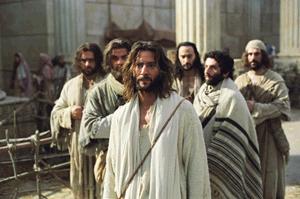

The problem with most Christian-themed movies is that they are not good movies. They may have good intentions, but frequently come off as cheesy or preachy. In order to help alleviate this, the makers of The Gospel of John decided to use the Gospel of John (from the Good News Bible version) as the working script for the film. In this manner, the film is pretty true to its source material. They had scholars look at the screenplay to make sure that it was accurate, especially important given its audience of Christians and potential Christians. Yes, it does appear to be an accurate account of the New Testament book, but in their painstaking quest for accuracy, they forgot that this is a movie.
Movies frequently take liberties with their source material, usually because film and the written word are different mediums. Film is more visual, and the written word can delve deeper into emotions and thoughts. While it has a compelling story, The Gospel of John falters in that it feels like a dull Sunday School lesson. Everything from the book is there on screen. The events unfold as they do in the Bible. Jesus gathers his disciples, travels around performing miracles, and eventually is crucified. What is missing is the emotion behind everything. The crucifixion and resurrection of Jesus is the cornerstone of Christianity, and a profound and emotional event. As they appear in The Gospel of John, they have little emotional impact.
Part of the issue comes with Christopher Plummer (Cold Creek Manor, Nicholas Nickleby), who narrates the film. In order to get as much of the text into the film as possible, director Philip Saville (Metroland, Angels) has Plummer extensively narrate the film. He goes so far as to say "Jesus said" then have Jesus (Henry Ian Cusick, Possession) say his line. In this sense, The Gospel of John feels more like a documentary than a feature film (of course, some would argue that it is a documentary). The narration throws all of the pacing off, and that is a large problem considering the film clocks in at exactly three hours. Was it necessary to film the entire book? There are events within the book that could easily take up the standard ninety minutes, so the entire Gospel of John was a little overkill.
The upside of Saville and screenwriter's John Goldsmith's (Young Blades, Agnes Browne) meticulousness is their drive to make everything authentic. Aside from what looks like a plastic cup of wine at the banquet where Jesus turned water into wine, the period costumes and settings look authentic. Most of the actors are relatively unknown, and their performances, especially the disciples, tend to be a little histrionic. Cusick is the opposite, and he portrays Jesus as a mellow, hippie-like Savior. His performance is also low on energy, which, when combined with the long running time and overly long narration sinks the film. The Gospel of John is an interesting experiment that never quite works. Yes, it is faithful and many people will love it just because of what it is (a better version of those sad, deluded Omega Code fans), but it doesn't do its source material justice.